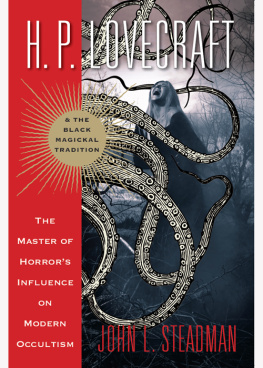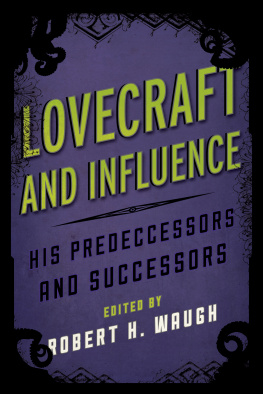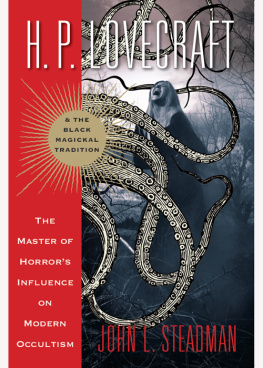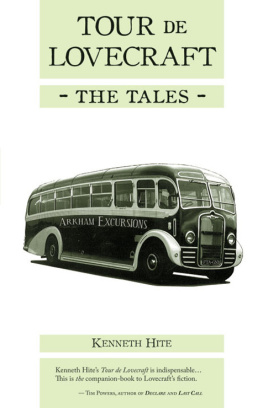Howard Lovecraft - In the Vault
Here you can read online Howard Lovecraft - In the Vault full text of the book (entire story) in english for free. Download pdf and epub, get meaning, cover and reviews about this ebook. genre: Science fiction. Description of the work, (preface) as well as reviews are available. Best literature library LitArk.com created for fans of good reading and offers a wide selection of genres:
Romance novel
Science fiction
Adventure
Detective
Science
History
Home and family
Prose
Art
Politics
Computer
Non-fiction
Religion
Business
Children
Humor
Choose a favorite category and find really read worthwhile books. Enjoy immersion in the world of imagination, feel the emotions of the characters or learn something new for yourself, make an fascinating discovery.

- Book:In the Vault
- Author:
- Genre:
- Rating:5 / 5
- Favourites:Add to favourites
- Your mark:
- 100
- 1
- 2
- 3
- 4
- 5
In the Vault: summary, description and annotation
We offer to read an annotation, description, summary or preface (depends on what the author of the book "In the Vault" wrote himself). If you haven't found the necessary information about the book — write in the comments, we will try to find it.
In the Vault — read online for free the complete book (whole text) full work
Below is the text of the book, divided by pages. System saving the place of the last page read, allows you to conveniently read the book "In the Vault" online for free, without having to search again every time where you left off. Put a bookmark, and you can go to the page where you finished reading at any time.
Font size:
Interval:
Bookmark:
In the Vault
by Howard Philips Lovecraft
There is nothing more absurd, as I view it, than that conventional association of the homely and the wholesome which seems to pervade the psychology of the multitude. Mention a bucolic Yankee setting, a bungling and thick-fibred village undertaker, and a careless mishap in a tomb, and no average reader can be brought to expect more than a hearty albeit grotesque phase of comedy. God knows, though, that the prosy tale which George Birch's death permits me to tell has in it aspects beside which some of our darkest tragedies are light.
Birch acquired a limitation and changed his business in 1881, yet never discussed the case when he could avoid it. Neither did his old physician Dr. Davis, who died years ago. It was generally stated that the affliction and shock were results of an unlucky slip whereby Birch had locked himself for nine hours in the receiving tomb of Peck Valley Cemetery, escaping only by crude and disastrous mechanical means; but while this much was undoubtedly true, there were other and blacker things which the man used to whisper to me in his drunken delirium toward the last. He confided in me because I was his doctor, and because he probably felt the need of confiding in someone else after Davis died. He was a bachelor, wholly without relatives.
Birch, before 1881, had been the village undertaker of Peck Valley ; and was a very calloused and primitive specimen even as such specimens go. The practices I heard attributed to him would be unbelievable today, at least in a city; and even Peck Valley would have shuddered a bit had it known the easy ethics of its mortuary artist in such debatable matters as the ownership of costly "laying-out" apparel invisible beneath the casket's lid, and the degree of dignity to be maintained in posing and adapting the unseen members of lifeless tenants to containers not always calculated with sublimest accuracy. Most distinctly Birch was lax, insensitive, and professionally undesirable; yet I still think he was not an evil man. He was merely crass of fibre and function thoughtless, careless, and liquorish, as his easily avoidable accident proves, and without that modicum of imagination which holds the average citizen within certain limits fixed by taste.
Just where to begin Birch's story I can hardly decide, since I am no practiced teller of tales. I suppose one should start in the cold December of 1880, when the ground froze and the cemetery delvers found they could dig no more graves till spring. Fortunately the village was small and the death rate low, so that it was possible to give all of Birch's inanimate charges a temporary haven in the single antiquated receiving tomb. The undertaker grew doubly lethargic in the bitter weather, and seemed to outdo even himself in carelessness. Never did he knock together flimsier and ungainlier caskets, or disregard more flagrantly the needs of the rusty lock on the tomb door which he slammed open and shut with such nonchalant abandon.
At last the spring thaw came, and graves were laboriously prepared for the nine silent harvests of the grim reaper which waited in the tomb. Birch, though dreading the bother of removal and interment, began his task of transference one disagreeable April morning, but ceased before noon because of a heavy rain that seemed to irritate his horse, after having laid but one mortal tenement to its permanent rest. That was Darius Peck, the nonagenarian, whose grave was not far from the tomb. Birch decided that he would begin the next day with little old Matthew Fenner, whose grave was also near by; but actually postponed the matter for three days, not getting to work till Good Friday, the 15th. Being without superstition, he did not heed the day at all; though ever afterward he refused to do anything of importance on that fateful sixth day of the week. Certainly, the events of that evening greatly changed George Birch.
On the afternoon of Friday, April 15th, then, Birch set out for the tomb with horse and wagon to transfer the body of Matthew Fenner. That he was not perfectly sober, he subsequently admitted; though he had not then taken to the wholesale drinking by which he later tried to forget certain things. He was just dizzy and careless enough to annoy his sensitive horse, which as he drew it viciously up at the tomb neighed and pawed and tossed its head, much as on that former occasion when the rain had vexed it. The day was clear, but a high wind had sprung up; and Birch was glad to get to shelter as he unlocked the iron door and entered the side-hill vault. Another might not have relished the damp, odorous chamber with the eight carelessly placed coffins; but Birch in those days was insensitive, and was concerned only in getting the right coffin for the right grave. He had not forgotten the criticism aroused when Hannah Bixby's relatives, wishing to transport her body to the cemetery in the city whither they had moved, found the casket of Judge Capwell beneath her headstone.
The light was dim, but Birch's sight was good, and he did not get Asaph Sawyer's coffin by mistake, although it was very similar. He had, indeed, made that coffin for Matthew Fenner; but had cast it aside at last as too awkward and flimsy, in a fit of curious sentimentality aroused by recalling how kindly and generous the little old man had been to him during his bankruptcy five years before. He gave old Matt the very best his skill could produce, but was thrifty enough to save the rejected specimen, and to use it when Asaph Sawyer died of a malignant fever. Sawyer was not a lovable man, and many stories were told of his almost inhuman vindictiveness and tenacious memory for wrongs real or fancied. To him Birch had felt no compunction in assigning the carelessly made coffin which he now pushed out of the way in his quest for the Fenner casket.
It was just as he had recognised old Matt's coffin that the door slammed to in the wind, leaving him in a dusk even deeper than before. The narrow transom admitted only the feeblest of rays, and the overhead ventilation funnel virtually none at all; so that he was reduced to a profane fumbling as he made his halting way among the long boxes toward the latch. In this funereal twilight he rattled the rusty handles, pushed at the iron panels, and wondered why the massive portal had grown so suddenly recalcitrant. In this twilight too, he began to realise the truth and to shout loudly as if his horse outside could do more than neigh an unsympathetic reply. For the long-neglected latch was obviously broken, leaving the careless undertaker trapped in the vault, a victim of his own oversight.
The thing must have happened at about three-thirty in the afternoon. Birch, being by temperament phlegmatic and practical, did not shout long; but proceeded to grope about for some tools which he recalled seeing in a corner of the tomb. It is doubtful whether he was touched at all by the horror and exquisite weirdness of his position, but the bald fact of imprisonment so far from the daily paths of men was enough to exasperate him thoroughly. His day's work was sadly interrupted, and unless chance presently brought some rambler hither, he might have to remain all night or longer. The pile of tools soon reached, and a hammer and chisel selected, Birch returned over the coffins to the door. The air had begun to be exceedingly unwholesome; but to this detail he paid no attention as he toiled, half by feeling, at the heavy and corroded metal of the latch. He would have given much for a lantern or bit of candle; but lacking these, bungled semi-sightlessly as best he might.
When he perceived that the latch was hopelessly unyielding, at least to such meagre tools and under such tenebrous conditions as these, Birch glanced about for other possible points of escape. The vault had been dug from a hillside, so that the narrow ventilation funnel in the top ran through several feet of earth, making this direction utterly useless to consider. Over the door, however, the high, slit-like transom in the brick facade gave promise of possible enlargement to a diligent worker; hence upon this his eyes long rested as he racked his brains for means to reach it. There was nothing like a ladder in the tomb, and the coffin niches on the sides and rear which Birch seldom took the trouble to use afforded no ascent to the space above the door. Only the coffins themselves remained as potential stepping-stones, and as he considered these he speculated on the best mode of transporting them. Three coffin-heights, he reckoned, would permit him to reach the transom; but he could do better with four. The boxes were fairly even, and could be piled up like blocks; so he began to compute how he might most stably use the eight to rear a scalable platform four deep. As he planned, he could not but wish that the units of his contemplated staircase had been more securely made. Whether he had imagination enough to wish they were empty, is strongly to be doubted.
Font size:
Interval:
Bookmark:
Similar books «In the Vault»
Look at similar books to In the Vault. We have selected literature similar in name and meaning in the hope of providing readers with more options to find new, interesting, not yet read works.
Discussion, reviews of the book In the Vault and just readers' own opinions. Leave your comments, write what you think about the work, its meaning or the main characters. Specify what exactly you liked and what you didn't like, and why you think so.




